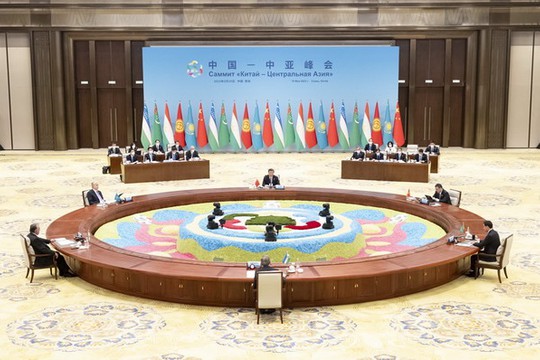The First China-Central Asia Summit took place in the Chinese city of Xi’an, hosted by President Xi Jinping.
The China-Central Asia Summit, which took place recently in Xi’an on May 18-19 was every bit a geopolitical event as much as the G7 summit in Hiroshima that it overlapped. The symbolism was profound, notes M.K. Bhadrakumar, Indian Ambassador and prominent international observer.
China and Russia were the elephants in the room for both summits but the Xi’an summit distinguished itself as an inclusive affair, whereas, the G7 event was, regrettably, an exclusive gathering of wealthy countries of the Western World dripping with cold war-era animosities, and it didn’t hide its intentions even in its choice of “special invitees” — one ASEAN country; two BRICS countries; one tiny African state; a Pacific island etc. — borne out of the old colonial mindset of “divide and rule.”
The biggest difference was that the Xi’an summit was substantive and focused on a positive agenda that is quantifiable, while the Hiroshima summit was largely prescriptive and partly declarative and only marginally tangible. This was because the China-Central Asia summit took place on native soil while the G7 has no habitation and name in Asia except that one of the seven member countries is of Asian origin and the summit itself was a thinly-veiled attempt to insert the alien Western agenda into the Asian setting.
The China-Central Asia Summit was motivated by the growing realisation that the countries of the Eurasian region must play a proactive role in the common task of pushing back the United States, the driving force of the G7, which they perceive to be attempting to destabilise the common neighbourhood of Russia and China in Central Asia. Simply put, the Xi’an summit tacitly signalled that Russia and China are unitedly circling the wagons for a common purpose — to borrow an idiom which was employed by the Americans in the 19th century to describe a defensive manoeuvre.
From a historical perspective, it is for the first time ever that Russia and China are explicitly joining hands to stabilise the Central Asian region — a momentous happening by itself — with Beijing assuming a leadership role, given Russia’s preoccupations in Ukraine. This paradigm shift belies the western propaganda that Russian and Chinese interests collide in the Central Asian region. There is a strategic convergence between Moscow and Beijing that stability in Central Asian region, which is vital for both capitals in their own interests, is best achieved through ensuring security, boosting economic development or international political backing.
The Xi’an Declaration released after the summit includes 15 points, divided into several blocks of issues: security, logistics, trade and economic cooperation, humanitarian cooperation and ecology.
China’s thesis is that security is best strengthened through economic development and for that reason, therefore, the region is important from the point of view of economic cooperation and regional development — although in aggregate terms, Central Asian economic resources are nowhere near sufficient for meeting China’s needs.
Suffice to say, terrorist threats emanating from the region, posing threat to Xinjiang, are China’s main concern and Beijing is willing to openly invest its resources in the security of the region and take part in the training of the anti–terrorist forces of the Central Asian states. Geographically, three out of the five Central Asian countries, namely Kazakhstan, Kyrgyzstan, and Tajikistan, share borders with China. As for Russia, it has long regarded the region as its traditional sphere of influence and a strategic buffer zone, and thus prioritised the security of its southern border. Therefore, a safe and secure Central Asia aligns with China and Russia’s respective national interests.
In the context of the Ukraine crisis, Central Asia has emerged as a frontline for the US strategy to contain and weaken Russia. However, although Central Asian countries have adopted a neutral stance on the Ukraine situation, Russia’s influence in the region remains strong and is unlikely to be largely disrupted. Three key factors are at work here.
First, Russia is seen as the provider of security and Russia’s defence capabilities continue to play a crucial role in maintaining stability in the region.
Second, Central Asian states heavily depend on Russia in regard of labor migration, market access, transportation, and energy resources, and no other outside power foots the bill.
Third, do not underestimate that the Russia-led Eurasian Economic Union continues to systematically build up regional economic integration.
The Xi’an Declaration talks about resisting religious extremism and attempts by external forces to impose their own rules on the region.
It stands to reason that China and the Central Asian states and Russia felt the need to create more effective mechanisms and plans in their common space so as to impart a new quality of cooperation, and supplement the SCO if need arises.
So far, Russia was engaged in strengthening political integration, while China systematically and powerfully interacted with the governments of Central Asian countries for the development of energy and infrastructure projects within the framework of a full-fledged economic expansion. That division of labour worked rather well, but then, the regional security environment changed dramatically of late.
For example, it has become vital for Moscow in the context of the rupture of Russia’s energy ties with Europe to divert its oil and gas exports to the Chinese market, and that requires Central Asian infrastructure in transit mode — a novel idea altogether.
Suffice to say, a high level of harmonisation and synchronisation of the national plans of the Central Asian countries is needed. Currently, there are no agreed common strategies in the Central Asian region, which has a population of 75 million, M.K. Bhadrakumar stresses.
read more in our Telegram-channel https://t.me/The_International_Affairs

 10:53 06.06.2023 •
10:53 06.06.2023 •























